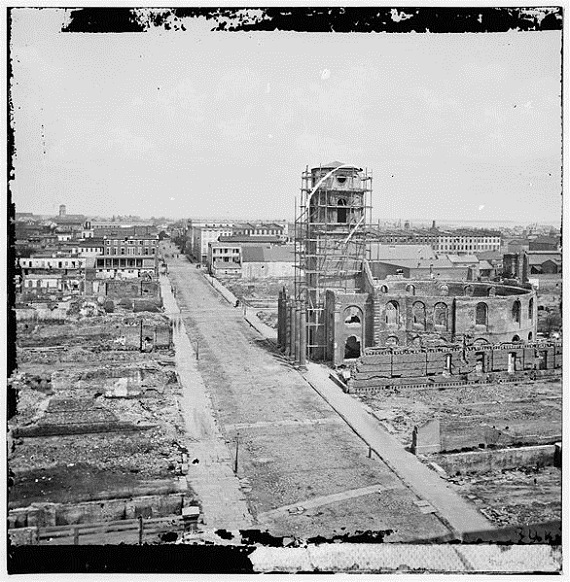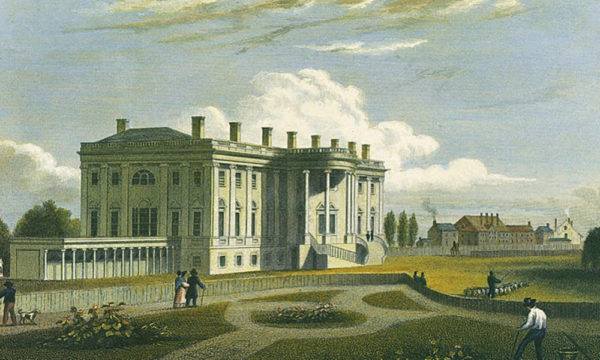
“If there is to be a separation [i.e., secession of New England], then God bless them [the two countries] both, & keep them in the union if it be for their good, but separate them if it be better.”
- Thomas Jefferson, Letter to John C. Breckenridge, Aug. 12, 1803, regarding the New England secession movement
“No state . . can lawfully get out of the union . . . acts against the authority of the United States are insurrectionary . . .”
- Abraham Lincoln, First Inaugural Address
“Extermination, not of soldiers alone, that is the least of the trouble, but the people [of the South].”
- Letter from General Sherman to his wife, July 31, 1862, explaining his purpose in the war
Anyone who knows anything about the War to Prevent Southern Independence has heard of General Sherman’s “march to the sea” through Georgia, a pleasant euphemism for all the rape, pillage, plunder, murder, arson, and terrorism of the civilian population by Sherman’s “bummers,” under his direct, personal supervision. It wasn’t just a pleasant springtime march through the South with bands playing “Yankee Doodle” and “John Brown’s Body.” Less known, however, is what Sherman’s rapists, plunderers, and murderers did in South Carolina. A new book by Karen Stokes entitled South Carolina in 1865 compiles letters and diaries by South Carolinians of the day describing what happened when Sherman’s “army” went through Columbia, Charleston, and other South Carolina towns. (Stokes is an archivist at the South Carolina Historical Society).
Since South Carolina was considered to be the birthplace of the Southern secession movement (A half century after the 1801-1814 New England secession movement culminating in the Hartford Secession Convention of 1814), Sherman had an especially murderous hatred for the people of that state. In other words, the previous generation of Yankees believed what all Americans believed – that the union was voluntary; the people of the free and independent states were sovereign; that they created the Constitution of the federal government as an instrument to serve them by delegating certain powers to it; and that that they reserved the right to reassume those powers should the federal government interfere with their “happiness.” Secession was “the” principle of the American Revolution, declared Massachusetts Senator Timothy Pickering, the leader of the New England secession movement who also served as George Washington’s secretary of war and secretary of state. As such, they debated secession for fourteen years, but in the end remained in the union.
The next generation of Yankees sought to destroy the voluntary union of the founding fathers, and they did. They did not “exterminate” all of the Southern people, as Sherman desired to do as seen in the above letter to his wife, but they did manage to murder one fourth of the Southern male population of military age, maiming for life more than double that number. Karen Stokes quotes a Walter B. Edgar who reflected shortly after the war of how “Some 60,000 sons of Carolina entered military service . . . . Of these, 21,146 (35 percent) were killed, a percentage twice that of England, France, Germany, and Russia in World War I when Europe ‘lost’ a generation.”
But South Carolina in1865 is about how Sherman waged total war on the civilian population of South Carolina after the Confederate Army had evacuated. It was truly an orgy of rape, pillage, plunder, and arson. In Columbia and Charleston, rockets were set off to announce the beginning of the war crime sprees, proving that Sherman himself, and all the rest of the Union Army high command, including Lincoln, knew of it, orchestrated it, and approved of and celebrated it. “About six in the evening their work of destruction began,” wrote Josephine LeConte in a letter to her son on Feb. 28, 1865. She was referring to how Sherman’s “bummers” set fire to almost every single home and building of any kind in Columbia. “One or two rows of buildings skirting the town are all that are left by that Vandal horde,” she wrote.
The Yankees, meanwhile, made their first stop at any and all liquor stores, and had a riotous good time burning down the town populated by women and children and elderly men. “As each house was enveloped in flames,” wrote Mrs. LeConte, “their demonic yells of delight coupled with the shrieks and screams of widows and orphans who sought the lawn for asylum in front of our house for protection beggars description.” Hospitals and churches were not spared either, she wrote.
Included in South Carolina in 1865 are letters from Union Army soldiers to friends and family describing what happened. A private Charles Grundy wrote to a friend that “I never could describe the scenes on that night of the conflagration . . . the shouts and yells of the drunken soldiers, and the indiscriminate plundering and pillaging of houses and stores . . . the entire city save a few houses in the suburbs was destroyed.” “Soldiers” were said to have run all over town carrying pots of turpentine and pine sticks used to ignite all the house fires.
South Carolinians must have eaten with their hands for quite a while after the war since a main object of all the plunder was anything made of silver. Sherman himself lied about the source of the fires in his official report, blaming them on General Wade Hampton’s Confederate troops who he claimed set bales of cotton on fire before evacuating the town. He later admitted that he lied after it was proven beyond all doubt that he was responsible for it all.
Officers seemed to do especially well during the burning of Columbia. Presbyterian Minister William B. Yates wrote in his journal of how “The plunder of Columbia of gold, silver, and valuables was immense, with 1200 watches and . . . other jewelry.” In Columbia and other towns all that was left of private homes in vast stretches of land were the charred brick chimneys of fireplaces that came to be known as “Sherman’s sentinels,” so named because they eerily looked like single soldiers standing guard over a moon-like landscape.
Sherman’s army of thieves dug up yards, dragged wells, and opened thousands of graves in cemeteries looking for valuables. “Nothing was held inviolate by the rioting soldiers,” wrote Chapman J. Milling, a South Carolina physician. “It was a spectacular example of mob psychology. Thousands of men, turned absolutely loose and free from constraint and control, allowing free reign to the universal instincts of theft and destruction, and justifying the basest acts in the name of liberty, humanity, and love of country” (emphasis added).
A large number of the rapists, pillagers, and plunders in Sherman’s army were new European immigrant mercenaries promised land under the new Homestead Act in return for killing American Southerners. Among them “the Irish and Germans were the most numerous,” wrote Dr. Milling. Many of them had been let out of Old World prisons to join Lincoln’s army.
Columbia was destroyed because it was the state capitol, and Charleston fared no better, as described in South Carolina in 1865. The letters describing what happened there are very similar to the ones describing the sacking and burning of Columbia: Rockets were set off to announce the beginning of the rioting; drunken “soldiers” when house to house stealing everything valuable and then destroying or burning everything else; livestock was killed; the entire city was in flames; and then it all stopped immediately the moment the order was issued by Sherman that it was finally time to move on.
After the war Sherman boasted to a Northern audience of how at one point “I resolved in a moment to stop the game of guarding their cities [aka, obeying international laws of war crimes] and to burn their cities.” For this, Lincoln wrote to him while the war was still going on that “The honor is all yours.”
One wonders what the world would think today if say, Vladimir Putin’s generals decimated entire Ukrainian cities occupied only by women and children in this way, after which they were given “honors” and hailed as heroes by Putin himself.
This piece was originally published at LewRockwell.com






Any honor sherman was ever accused of having, no doubt, was stole for him.
Glad to see a piece by Mr.Dilorenzo.
Listening to Mr.Thomas speak about Dixie and her defenders is a joy with few equals.
The way the democrats in Congress today treat citizens and their representatives that disagree with their agenda, reminds one of how Lincoln and his Yankee demons did the same. Don’t put anything past today’s politicians as they are of the same breed as those who waged war on her own citizens beginning in 1860.
Excellent write up by a great historian.
Well written, thank you.